Exodus: Gods and Kings
 for violence including battle sequences and intense images.
for violence including battle sequences and intense images.
Reviewed by: David Criswell, Ph.D.
CONTRIBUTOR
| Moral Rating: | Very Offensive |
| Moviemaking Quality: |
|
| Primary Audience: | Adults Teens |
| Genre: | Action Adventure Drama 3D |
| Length: | 2 hr. 22 min. |
| Year of Release: | 2014 |
| USA Release: |
December 12, 2014 (wide—3,300+ theaters) DVD: March 17, 2015 |
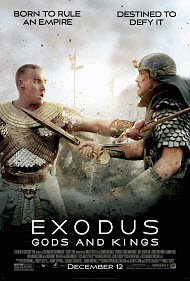

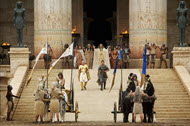
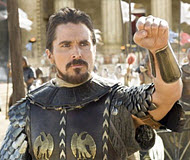
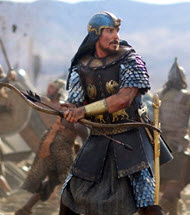
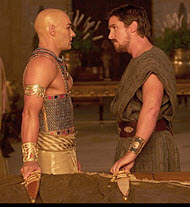
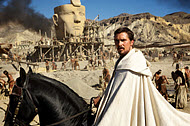
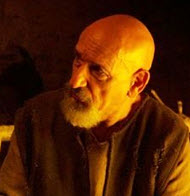
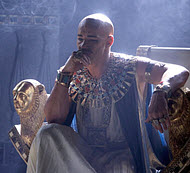

How should the Church respond to “Exodus: Gods and Kings”?
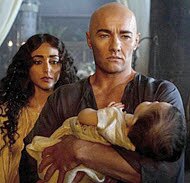
Miracles, including list of biblical miracles
Is it logical to believe that the biblical miracles really happened? Answer
“Miracles are not possible,” some claim. Is this true? Answer
Is the God of Israel in this movie, vengeful and mean? How is the real God of the Bible different? —slow to anger, goodness, justice, holiness, righteousness, love, gracious, merciful, etc.

Zipporah, wife of Moses
Moses and the exodus—How God gave his people freedom in a land of slavery and death (in our God’s Story section)
Moses—The man who wanted to see God
Miriam, sister of Moses
Aaron, brother of Moses
Why did God harden Pharaoh’s heart?
- The Ten Commandments (1956)
- Moses (1995)
- The Prince of Egypt (1998)
- In the Beginning (2000)
- The Ten Commandments (2007)
- The Bible: The Epic Miniseries (2013)
| Featuring |
|---|
|
Christian Bale … Moses Joel Edgerton … Rhamses Aaron Paul … Joshua Sigourney Weaver … Tuya Ben Kingsley … Nun Ben Mendelsohn … Robin Van Der Zee … Hegep Indira Varma … Miriam John Turturro … Seti See all » |
| Director |
| Ridley Scott — “Kingdom of Heaven” (2005), “American Gangster” (2007), “Body of Lies” (2008), “Prometheus” (2012) |
| Producer |
|
Chernin Entertainment Scott Free Productions See all » |
| Distributor |
|
Chernin Entertainment Scott Free Productions See all » |
The story of the Exodus is one of the greatest stories ever told. Even without knowledge of the rich traditions and historical events surrounding the Exodus, the events of that time shaped the future of the world, and not just the Jews or the west, but every corner of the planet. I am therefore somewhat dumbfounded how Hollywood has repeatedly managed to mess up the story and alter it to their own liking. This is not to say that there have been no good movies about the Exodus, but not a single one to date does the historical or Biblical events justice. Now it is Ridley Scott’s turn to try to do justice to the story, but Ridley Scott is an agnostic. Would he do justice to Exodus?
Owing to the nature of Biblical epics, I feel it is necessary to divide my review into three sections. The first will deal with the movie itself. From a strictly cinematic viewpoint, how does the film stand up. Is it entertaining? Does Christian Bale make a believable Moses? Will the film stand the test of time. The second section of this review will deal with its Biblical accuracy, or lack thereof. What does the film change? Is it accurate? Does it show due respect to Moses and the historical events of the Exodus? Finally, I will address objectionable content.
Cinematic review
Ridley Scott is a talented director, of that few can doubt. His second film was the surprising hit film “Alien.” He followed it up with “Blade Runner,” which earned due credit on video, even if it was neglected at the box office. He is best known to younger viewers as the director of the absurdly unhistorical and exploitive movie “Gladiator.” It is natural to expect that “Exodus” would have the same polished look and feel, but to an extent that is the problem. At times, Moses sounds like Maximus from “Gladiator,” shouting and screaming with a sword in hand. There is even a scene where Pharaoh Seti regrets that Rhamses would succeed him instead of Moses (just like in “Gladiator”). We feel, at times, as if we are watching a retread of “Gladiator” or “Kingdom of Heaven.” Moses even leads the Jews in military revolt before God intervenes and issues the Ten Plagues upon Egypt.
It is fair to start with the movie’s strengths. It tries, with moderate success, to emphasize the brotherhood of Pharaoh and Moses. The Moses character of feels that the Egyptians are his family, and not the Jews. His character is meant to change slowly over the course of the film. In the beginning, Moses is a skeptic who refuses to even acknowledge his kinship with the Jews. Eventually, through the course of events, he becomes the leader of the Jews, but as well intentioned as the script may have been, Moses’s transformation is never quite believable, nor convincing. Aside from this, the film falls flat, emphasizing special effects rather than characterization.
In fairness to Scott, the film is more respectful than the movie “Noah,” but then it would be hard to be that blasphemous and bad, and this is hardly the standard which we should accept. The biggest problem with “Exodus” is its alterations to the Biblical story. I will address most of these below, but it is notable that the film appears to make many of the miracles appear as natural phenomenon triggered by God. Even the parting of the Red Sea is portrayed, not as a parting, but as a dried up sea bed. It is a hurricane of sorts that brings water in from afar.
Is it logical to believe that the biblical miracles really happened? Answer
Now it is clear that these are still intended as miracles, but throughout the film even the priest of Egypt tried to dismiss the miracles as natural phenomenon. In fact, the priests acknowledge that the plagues are miracles, but try desperately to claim that the gods of Egypt are stronger. The Pharaoh is not an agnostic but a worshiper of false gods whom he believes will eventually overpower the Israelite’s “one true God.” This is only hinted at in the film when Pharaoh arrogantly declares “I am a god! I am a god!”
Another problem is that while seeming to downplay the miraculous nature of the plagues, it is no irony that the movie is filled with completely unrealistic scenes which actually made me chuckle. Three scenes come to mind. First was my shock at finding that the Chinese apparently did not invent gun powder, for Moses leads a revolt against Pharaoh and triggers massive explosions: yes, explosions. Even in historical epics from antiquity, Hollywood still has to blow things up! Second, in a scene seemingly lifted from “Gladiator,” Moses stabs a chariot with his spear, causing it to fly into the air (Isaac Newton would shudder).
Finally, when the Red Sea drowns all of Egypt’s army, Moses and Pharaoh are staring each other down in the middle of the Sea when the water hits. Apparently both are strong swimmers, for they both survive (no one else does), ending up on opposite sides of the sea.
Finally, it must be noted that “Exodus: Gods and Kings” is exceedingly depressing in tone. Nowhere do we see singing Jews celebrating their freedom as in the song of Miriam. If “The Prince of Egypt” was the happy Exodus movie (and best) then “Exodus: Gods and Kings” is clearly the darkest and most depressing. This too seems to be a trademark of a Ridley Scott film, but it is also a sad commentary on agnosticism, for I cannot think of an agnostic filmmaker who really makes happy films. This irony should not go unnoticed. Ultimately, it is only God who can give us true happiness.
Inaccuracy, wrong Pharaoh, wrong Moses, etc.
There are a plethora of alterations and mistakes in the film; some of which have been alluded to already. Some are alterations made for cinematic reasons. Some are errors in exegesis and bad archeology. Others are deliberate theological alterations which reflect the director’s agnosticism. I will reserve the more troubling ones for last.
The first and most glaring error is apparent in the trailers, and, unfortunately, is one found in every movie about the Exodus ever made. It is of concern because Bible critics take advantage of the mistake to claim that the Bible is a historical myth. I refer to the fact that Rhamses was not the Pharaoh of the Exodus. 1 Kings 6:1 (among others) places the Exodus almost 150 years before Rhamses. This is important because the archaeological evidence supports an Exodus in the 15th century before Christ, but offers no support for an Exodus under Rhamses.
Atheists and others emphasize the lack of evidence for Rhamses, and take advantage of the fact that most people have been trained to think of Rhamses as the Pharaoh of the Exodus. Moreover, the actual events surrounding the Exodus would make for a fascinating subplot were it not for the fact that these films must rewrite part of the Bible to make the story fit with Rhamses. Consider, for example, the fact that the Pharaoh who sought Moses’ life died before the Exodus. The Pharaoh of the Exodus was not his step-brother, but his step-nephew.
A long list of errors and alterations could ensue, including the fact that the film portrays only nine years between Moses’ exile and his return. Moses is shown killing the guard in self defense (Exodus 2:11-12). Moses is around 40 years old when he leads the Exodus (Exodus 7:7). Moses is thought to be a true Egyptian by all in the Egyptian court, and a host of others.
Some have also objected to the portrayal of Egyptians and Jews by white Europeans, but this is only partially true. First, Egyptian art depicts Egyptians as red, Nubians as brown, and Semites (like Jews) as yellow. Second, Sir Ben Kingsley is actually half Indian. Likewise, many of the lesser characters are Indian, near easterners, and Jews. Still, it is fair to criticize the reality of Rhamses being portrayed by a Welsh actor. Nevertheless, far more important alterations follow.
One serious alteration is that of Moses himself. He is portrayed as an agnostic before his encounter with God on Sinai. Although Moses argued with God in the Bible, the movie clearly portrays Moses’s wrestling with God on a more cynical level. At one point in the film, Moses shouts at God “if you meant to humble me, it will not work!” This in contrast to the declaration that “Moses was very humble, more than any man who was on the face of the Earth” (Numbers 12:2). He also tends to shout rather than stutter as Jewish tradition recounts (cf. Exodus 4:10). Most intriguing is that he only meets Pharaoh twice face to face before the death of the first-born children. In the first encounter, Moses pulls a sword on Rhamses and threatens him. He does not say “Let my people go,” but speaks of his own authority as a rebel leader. He spends much of the movie hiding from Pharaoh, and he even tries to lead a military revolt before God intervenes.
Arguably, the strangest alteration to the Bible, made clearly to appeal to fans of Scott’s action films, is the depiction of Moses leading a war of attrition against Egypt. The Jews are taught to fight and attack several military and supply sites. This revolt is clearly out of place in the film and completely un-Biblical. From the beginning, God told Moses what to do and say, but this leads to another change: God. In the film, God is portrayed as a little boy. He first appears standing in front of the burning bush and appears at recurring points in the film. Moses is seen arguing with a child.
Finally, I have already alluded to the fact that the miracles are made to look more like natural phenomenon unleashed by God, but the irony is that such “natural” events are far more unrealistic than a supernatural event. Consider the plague of blood. In the movie, a series of crocodiles attack and eat so many people and animals that the water of the Nile becomes filled with the blood of their victims! Would it not have been better (and more realistic) to simply portray it as it is recounted in the Bible?
Objectionable content
Obviously, most objectionable are the alterations to the Bible itself, but as those have been addressed, the question is what should parents be leary of their children seeing? Well, the good news is that there is no foul language, since the Egyptians do not speak modern English slang (although Moses does issue at least one modern idiomatic remark). Likewise, there is no sex in the film, although there are a number of scantily clad Egyptian women. The real problem, in terms of content, is obviously violence.
It is not surprising that the story of the Exodus is violent, but the violence is graphic at times. Moses is engaged in several fights and battles which involve blood and even some gore, but the most graphic scenes involve the director’s envisioning of the plague of blood as described above. Crocodiles are seen eating people in graphic scenes.
In days past “Exodus: Gods and Kings” might have garnered an R-rating, but it is not much worse than any number of PG-13 films on the market today. Its real offensive content lies in its alterations to the Bible.
Summary
The revival of Biblical epics began with “The Passion of the Christ,” but that revival has more often than not felt like one led by Jim Baker rather than Billy Graham. The most recent debacle was “Noah” written and directed by an atheist which portrayed Noah as a sociopath plotting to kill his own children. “Exodus: Gods and Kings” is not a blasphemous film, but neither is it particularly God honoring either. The Moses of the movie is reflective of its agnostic director. He is a skeptic who looks too much like Maximus and too little like the great Prophet of the Bible. Likewise, Rhamses appears more like a petulant child than one of the greatest Pharaohs who restored Egypt to greatness a hundred and fifty years after Egypt’s humiliation under Moses (oh, wait… I was thinking of the real historical story of the Exodus! Sorry.).
Overall, “Exodus: Gods and Kings” falls short of most of the plethora of previous renditions. If you want to see a movie about Moses, I would recommend “The Prince of Egypt” or even the inaccurate but respectful “The Ten Commandments” by Cecil B. DeMille. I would also recommend the 1995 TV miniseries “Moses” with Sir Ben Kingsley. None of those films get the historical facts straight (they all subscribe to the un-Biblical myth that Rhamses was the Pharaoh of the Exodus), but they are more respectful, make fewer alterations, and are more entertaining.
Violence: Heavy to extreme / Profanity: None / Sex/Nudity: Mild
See list of Relevant Issues—questions-and-answers.


Moral rating: Average / Moviemaking quality: 4
Moral rating: Average / Moviemaking quality: 4
I cannot expect a director who is not a Christian to understand the presence of God, but one thing is for sure, the presence of the True Almighty God brings conviction, and His presence is so Holy that no man can stand under it. If that was the True God who had appeared to Moses, Moses would have been kneeling on the ground with huge conviction and humiliation. The depiction of God had no “Awesome Presence” that left Moses humbled. Instead we are left to witness a flat presence which carries no lasting effect. See all »
Moral rating: Average / Moviemaking quality: 4
But one inaccuracy that will be missed is the explanation of what the Law was for. It was not given to guide where men are frail. It is the ministry of condemnation, the impossible burden to show we are still enslaved to sin, but this legalists will miss. If we ignore the film, it will go away, for it is not great cinematic art. But I found it interesting, an entertainment and nothing more.
Moral rating: none / Moviemaking quality: 4
We don’t know what the conversations between God and Moses were like. We don’t know what they were like between Moses and Pharaoh. Many people have criticized Ridley Scott for his Atheism/Agnosticism and being the director, but I think that his questions about faith come through pretty clearly in this film.
Moses is presented as a confused, reluctant and highly conflicted man. I think that, in fairness, that is exactly how most of us would feel if our world were suddenly turned upside down, and we were revealed to be something other than what we believed we were. See all »
Moral rating: Average / Moviemaking quality: 5
Moral rating: Average / Moviemaking quality: 3½
The actors will have to examine their own conscience; they have chosen Money and Fame over truth (even if they do not believe in Christianity, the film is not a true representation of Exodus as written in the Bible. However, everyone is entitled to their opinion; I just wish a little more intelligence had been applied to the script.
Moral rating: Extremely Offensive / Moviemaking quality: ½
From there things went from bad to worse. When Moses discovered—by accident—that he was a Hebrew, he kills two soldiers in self defense. He is then exiled when the tale reaches the ears of his “cousin” Rameses (never mind that Rameses could not have been Pharaoh during the Exodus, since his reign was close to 150 years after the children of Israel departed Egypt).See all »
Moral rating: Very Offensive / Moviemaking quality: 3½
• God is played by a bratty little child
• Moses is typically yelling at him
• Miracles are as if they could be of natural causes
• “God” is made out to be an uncaring and petty killer of children (the firstborn sons)
• Pharoah is a reasonable guy
• Moses and God are the unreasonable deranged ones
Typical Hollywood fare, aside from all the historical errors this script on Exodus makes sense to those who hate God, because what they hate is being accountable.
Moral rating: Extremely Offensive / Moviemaking quality: 3
The very bad. Ridley Scott’s handling of the timeline of chronological events leading up to and including the Exodus is completely out of order, out of whack, inconsistent, and in many places completely made up. Many things never even happened. Not surprisingly, this is a Bill-Nye friendly version of the Exodus, as Hollywood plays down the supernatural cause of the plagues to a naturalistic progression of disease of one event to another. See all »
Moral rating: Very Offensive / Moviemaking quality: 5
Moral rating: Offensive / Moviemaking quality: 5
The murmurings throughout the movie and the uncomfortable silence as we all left the theater was a strong indication that most of us felt “had.” My son and I began to read the Exodus when we left the theater, and we will be reading and discussing for days. So, in that, I’m glad that we opened discussion about the fact that the world does not believe the Bible is accurate, so directors who do not have a relationship with God and do not value His Word would feel the license to change to what they already believe is fiction.
My issues with the film are too numerous to list here, but let me address a few concerns I have in the “artistic license” that the director takes. (Spoilers) Yahweh and the angel of the Lord are represented as a child. The angel of the Lord is not a child; angels are mighty warriors as we see in Daniel, when they seek to come defend Daniel but are held up as they battle the prince of Persia (a demonic warrior). And He did not present Himself in the burning bush and on the mount as a child, but as “I am,” an all knowing, powerful-but-merciful Almighty God. (Moses was afraid to look at Him.) See all »
Moral rating: Very Offensive / Moviemaking quality: 4
Every moment of The Ten Commandments is so captivating with top quality story, scripts, acting, directing, sets, costumes, visual effects, and music that time really flies by when watching it. “Exodus: Gods and Kings,” however, is so desperately dull, with horrible script, cheap looking sets, lack luster performances, I can honestly say that it’s the worst movie I have seen in a very long time. Even the music was forgettable (except when it sounded like the “Stargate” movie soundtrack, which it did a lot). And don’t even get me started on the visual effects in “Exodus: Gods and Kings,” the ONE scene in the entire movie that’s really CGI and really great is directed so completely without thought that it makes no sense whatsoever…See all »
Moral rating: Very Offensive / Moviemaking quality: 1
Moral rating: Extremely Offensive / Moviemaking quality: 3
I don’t feel like I have wasted my money, but I do feel across the board the profane and debase subjects get better treatment and craftsmanship than The Holy Bible.
Moral rating: Very Offensive / Moviemaking quality: 4
Moral rating: Average / Moviemaking quality: 2½
Moral rating: Extremely Offensive / Moviemaking quality: 4½
***SPOILER*** In the awful movie, a chain reaction of plagues occur: alligators go wild and eat people, causing their blood to turn the Nile red. The blood causes the frogs in the river to jump out into Egyptian homes. The dead frogs bring larvae that become gnats/flies. The bites from the gnats/flies causes boils on the skin and deadly infections on animals. Not ONCE does Moses appear before Pharaoh [Ramses, historically inaccurate]. And, Moses gave away his staff, early on, to a shepherd boy. God appears a few times as a 10 year old boy who makes inaccurate statements and screams back and forth at a screaming Moses.See all »
Moral rating: Very Offensive / Moviemaking quality: 4
As a Christian I should have read the reviews before watching it. It will appeal perhaps to secular viewers for the special effects, as they are grandiose, including bomb blasts… It sadly misses out on the whole story line.
From the many comments I have now read about the film, I wish not to repeat the many discrepancies already mentioned. Here are a few comments of my own: Moses relied on a sword from Pharaoh’s house and not a staff in the movie. None of the miracles of manna and quail were depicted. Moses never struck a rock for water. The biblical account of Moses and Aaron pleading with Pharaoh to let the people go is reduced to a few encounters that don’t follow the story line. Rather, plagues seem to arrive one after another, not to mention the crocodiles eating people, turning the water red… Pharaoh is depicted as a helpless father and not a stubborn leader and enslaver.
For me personally, the film was blasphemous.
Moral rating: Extremely Offensive / Moviemaking quality: 3½
This is the language often used by liberal, agnostic/atheistic filmmakers—they “humanize” a Biblical story (as in the movie Noah) and make it seem like God is not omnipotent, but rather nature—and the nature of man—is omnipotent. Even at the end of the movie, Moses hammers out the tablets of the ten commandments—not God created as there is no dictating by this God-child shown. This humanizing treatment devalues our true God, and could even be seen as Moses being nothing more than an activist freeing the slaves, and himself creating words on tablets of stone—never mentioning these Ten Commandments of God! These are but writings of a man in a cave. Kind of sounds like Mohammad in a cave telling stories that became a religion—Islam. This humanistic comparison symbolism is there.
Moral rating: Average / Moviemaking quality: 3½
Moral rating: Offensive / Moviemaking quality: 2
Moral rating: Extremely Offensive / Moviemaking quality: ½
The only minor thing it got right was that Moses was a general in the Egyptian army… BEFORE he slew the Egyptian and fled unto Midian. However, the events that were depicted, even there, most likely never happened. In Book II Section X of Antiquities of the Jews, the Jewish historian Flavius Josephus (c. 37 A.D.—100 A.D.) saith that Moses was a general in the Egyptian army and laid siege to the city of Saba (an event mentioned in Cecil B. DeMille’s epic 1956 partial remake of his own film “The Ten Commandments”). See all »
Moral rating: Extremely Offensive / Moviemaking quality: 3
The Holy Bible is believed to be the best-selling book and Christianity the biggest religion (although these statements are contested). Why then deliberately distort what many regard as truth? I didn’t like the movie “Noah” at all, but “Noah” was depicted as a fictional story and rightly falls into one of those genres. To us Christians, it is heartbreaking; but “Exodus: God’s and Kings” is blasphemous. To be able to “follow” the story, you need some knowledge of the biblical account of the events. What makes it worse, is that it is most appealing to teenagers and young adults. So the question remains: “What was the intention of the making of this movie?”. I was just shocked.
Moral rating: Extremely Offensive / Moviemaking quality: 2
Moral rating: Average / Moviemaking quality: 2½
Moral rating: Very Offensive / Moviemaking quality: ½
For example they tried to make all the miracles of the plagues appear to be the cause of some natural (if unusual) disasters. And whoever thought of portraying God as a child needs to have whatever credibility he or she may have had revoked permanently.
My respect for Cecil B. Demille went up a hundred fold after viewing this travesty. Why change the story to fit someone’s weird, misguided interpretation when the story in the Word of God cannot be excelled. The burning bush was paramount to this story; but was relegated to a comical portrayal of the utmost absurdity including a landslide burying Moses up to his face when the child god first appeared to him, with the burning bush almost hidden behind him.
There was no inclusion of the rod in Moses hand, and throughout, the director assumed it should be a sword instead. Neither did God speak to Moses to remove his shoes because he was standing on Holy Ground. (I guess that has to be left out because he wasn’t standing, but was buried in mud!)
The writers, directors, producers and cast should beg God to forgive them for this diabolical portrayal.
Moral rating: Extremely Offensive / Moviemaking quality: ½
Moral rating: Extremely Offensive / Moviemaking quality: 4½
Additionally, I think we Christians should be very careful in how we respond. I think your review is well written, generous and graceful. It presents the facts and argues without emotion. Thank you for giving us an excellent example as to how to respond.
Moral rating: / Moviemaking quality:
Moral rating: Very Offensive / Moviemaking quality: 3½
PLEASE share your observations and insights to be posted here.

 Answers about the pharaohs of the Bible
Answers about the pharaohs of the Bible
My Ratings: Moral rating: Good / Moviemaking quality: 3½